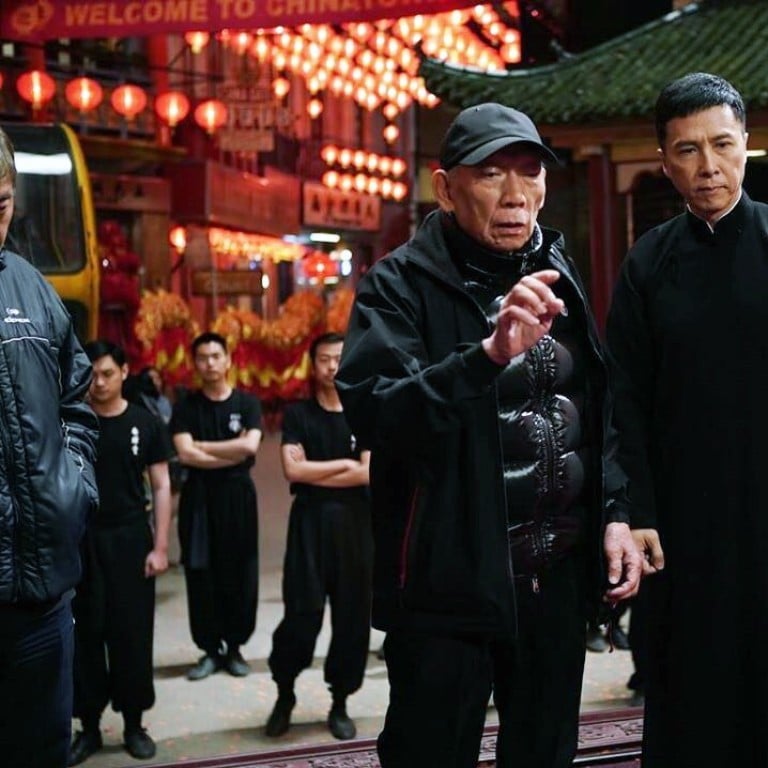Who is Yuen Woo-ping, the Hong Kong kung fu master behind The Matrix, Kill Bill and Crouching Tiger, Hidden Dragon?

Primarily an action choreographer, Yuen has worked on some of the biggest films in modern Hollywood history. His work on The Matrix reinvented action cinema; he brought to life Quentin Tarantino’s “roaring rampage of revenge”, Kill Bill; and the sword fights he helped put together for Crouching Tiger, Hidden Dragon brought wuxia to the West. The film remains the only Chinese-language film to have won the Academy Award for best international feature film.
What makes Hong Kong star Chow Yun-fat ‘the coolest actor in the world’?
Yuen was born in Guangzhou, China. His father, Simon Yuen Siu-tien, taught him kung fu and was a veteran of Peking opera, a tradition that provided a gateway into films for many stars of this era, including the likes of Jackie Chan and Sammo Hung.
Filmmaking was a family affair for the Yuens. One of 10 children, six of his brothers also went into the film business. The siblings started out working on projects alongside their father, who was an action choreographer and occasional actor. Yuen received instruction on set from his father, but he would also observe what others were doing and keep an eye on how scenes were shot and what directions were given to actors.
Like his contemporary Sammo Hung, after earning his chops as a stuntman and bit part actor, Yuen earned the right to work as an action choreographer himself. While Hung worked with legendary director King Hu, director of A Touch of Zen, Yuen received tutelage from Chor Yuen, director of wuxia hits like Killer Clans as well as the record-breaking comedy The House of 72 Tenants.
How Hong Kong’s film industry got so big – and why it fell into decline
Yuen’s big break came in 1978 when he was given the director’s chair for two kung fu flicks, Snake in the Eagle’s Shadow and Drunken Master, which would finally put their lead actor, Jackie Chan, on the map. The latter film in particular was especially popular. Both Yuen and Chan took a risk in Drunken Master by portraying Cantonese folk hero Wong Fei-hung – the subject of over 100 films – as immature and disobedient, albeit a talented fighter. The gamble paid off, though, and help set the tone for much of Chan’s career with its nascent mix of action and comedy.
It wasn’t until 1988 and the action film Tiger Cage that Yuen entered a hot streak. A modest hit, Yuen followed Tiger Cage by directing In the Line of Duty IV (1989) and Tiger Cage 2 (1990) – two hard-hitting action classics that featured the increasingly impressive skills of Yen alongside gun-toting Cynthia Khan. After working with Chan again as action director on Twin Dragons (1992) and new star Jet Li on Once Upon a Time in China II (1992), Yuen directed one of his biggest hits, Iron Monkey (1993), a personal favourite of his.
7 biggest snubs at the Hong Kong Film Awards ever
By the time he had finished work on Fist of Legend (1994) – Jet Li’s reimagining of Bruce Lee’s Fist of Fury – and the Michelle Yeoh fronted Wing Chun (1994), Yuen had established himself as one of the foremost professionals in his field anywhere in the world.
Unsurprisingly, Hollywood eventually came calling. The Wachowskis, directors of The Matrix, were not the first to ask Yuen to come West. He had declined previous offers to work in America, believing his English was not good enough. Even for The Matrix, Yuen was hesitant to work stateside. “What happened then was that one of the producers of The Matrix contacted Shaw Brothers to find me. They seemed to want me to go to Hollywood really badly, but I still didn’t want to go. Then Shaw Brothers [studio] told me that the producer was offering me a free ticket to Los Angeles, and all I had to do was turn up there and have a chat, and that I should go, as it would be the polite thing to do.”
Which Hong Kong eatery serves a dish inspired by Bruce Lee’s yellow jumpsuit?
The rest is history. Yuen’s work on the The Matrix helped redefine action cinema and introduced Western audiences to a number of long-time stylistic staples of Hong Kong actions films such as wire fu and gun fu.
Even today, more than 20 years after The Matrix first hit screens, Yuen continues to be an inspiration. The ongoing John Wick franchise, one of the biggest action series in recent Hollywood history, stars Keanu Reeves and was directed by Chad Stahelski, a former stuntman who worked with both Reeves and Yuen on, yes, The Matrix.
Want more stories like this? Sign up here. Follow STYLE on Facebook, Instagram, YouTube and Twitter .

Working with greats like Jet Li, John Woo and Jackie Chan, the 75-year-old’s career has been filled with eye-popping action both in Hollywood and Hong Kong, with Yuen’s martial arts choreography on The Matrix trilogy raising the bar for fight scenes forevermore